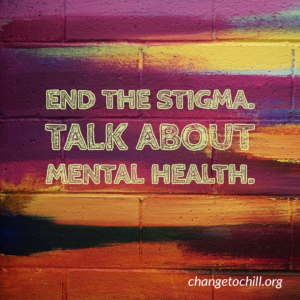Reducing Stigma about Stress and Related Conditions
Stigma is a mark of disgrace that sets an individual or a group apart. It’s a label. A stereotype. A pre-judgment before getting to really know the person and the details of their situation. Stigma leads people to reject, avoid, or fear those they perceive as different. We’ve all seen stigma in action, and probably experienced it ourselves as well.
There are lots of different kinds of stigma. At Change to Chill, we’re concerned with stigma about stress and related problems such as anxiety, depression or other mental health conditions. We also know there can be stigma about things people do to take care of themselves, such as meditation or breathing exercises. Some people think those things are silly or really weird. But we know they are really awesome…and we’re out to convince others of the same thing!
You can be a part of helping in the fight against stigma! Check out these facts and conversation starters about stigma and start being the change today.
Stigma and Mental Health
- Talk with friends and family about your mental health self-care practices or routines, whatever they are. Ask others about what they do.
- If you know someone who is struggling or who has a mental illness, ask things like, “How does this feel for you?” “How can I support you?” “Do you want to talk? Or go for a walk? Or just hang out? I’m here to listen or just be quiet together.”
- Be honest about treatment. If you see a therapist, psychiatrist, or other professional, be willing to talk about that with friends and family, just like you might if you needed a filling or your wisdom teeth removed.
- Share supportive messages about mental health and mental wellness on social media, such as these Chillers.
- Visible “above the surface” elements such as music, language and food.
- Invisible “below the surface” elements such as facial expressions and use of eye contact, norms about time and personal space, beliefs about what leadership means and looks like, and attitudes and beliefs about mental health and mental illness.
- How is mental health self-care viewed? Is it seen as essential? A nice bonus? Not important? Wasteful or self-indulgent?
- How is mental illness viewed? What words are used to describe mental health conditions?
- What are believed to be the causes of mental wellness, mental illness, or both?
- What kind of care, formal or informal, is available for people who are experience mental distress?
- What differences are there in how mental health or mental illness are view based on age, gender, race or socio-economics?
- Feeling very sad, withdrawn or unmotivated for more than two weeks.
- Making plans or trying to harm or kill oneself.
- Out-of-control, risk-taking behaviors.
- Sudden overwhelming fear for no reason, sometimes with a racing heart or fast breathing.
- Not eating, throwing up or using laxatives to lose weight, significant weight loss or weight gain.
- Severe mood swings causing problems in relationships.
- Excess use of drugs or alcohol.
- Drastic changes in behavior, personality or sleeping habits.
- Extreme difficulty in concentrating or staying still.
- Intense worries or fears getting in the way of daily activities like hanging out with friends or going to classes.




 Pinterest
Pinterest  Instagram
Instagram 

